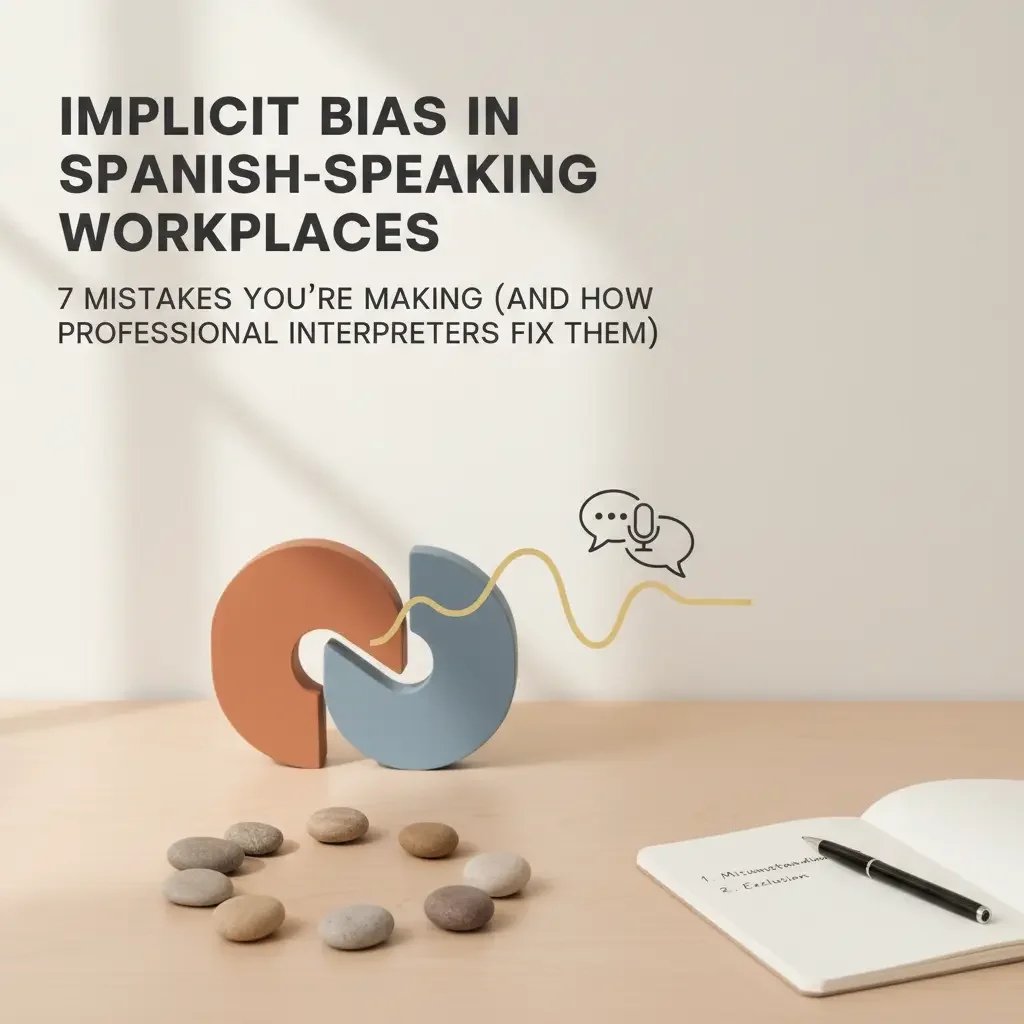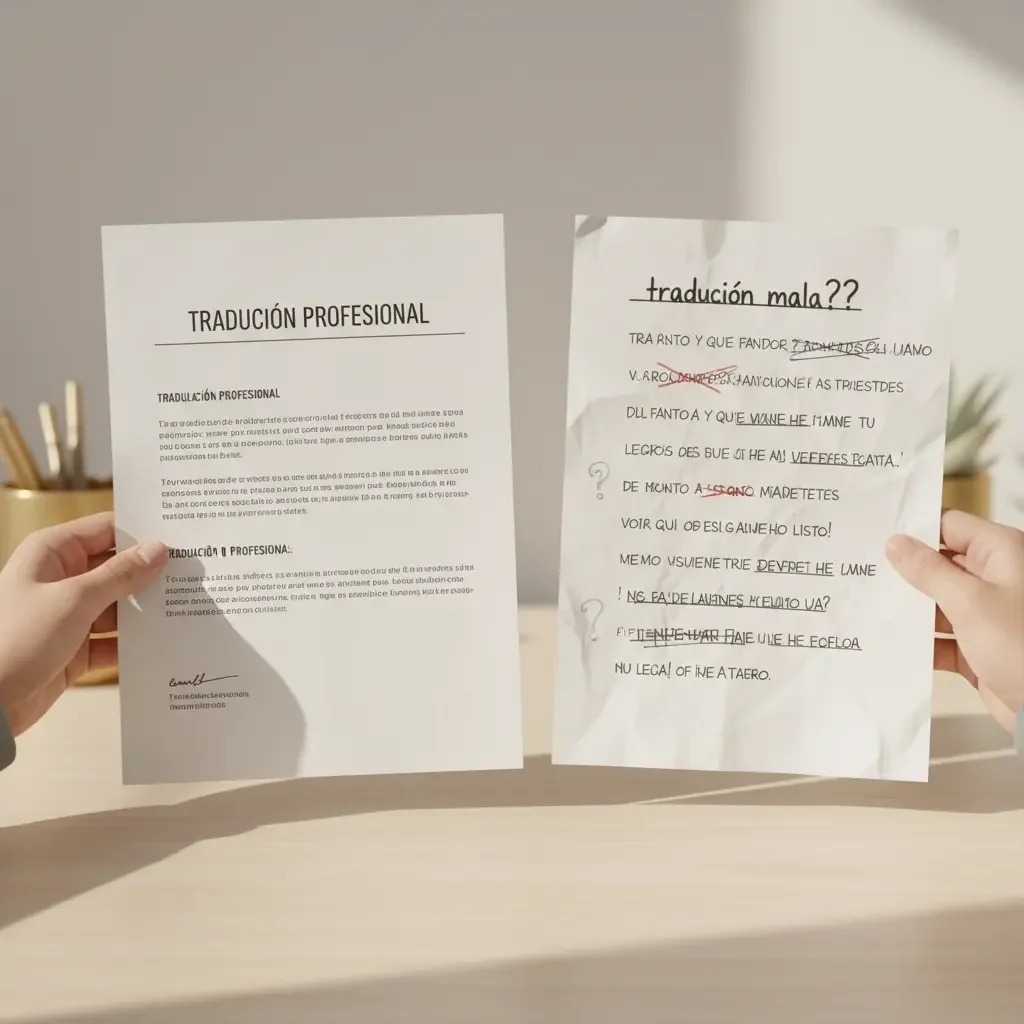Implicit Bias in Spanish-Speaking Workplaces: 7 Mistakes You're Making (and How Professional Interpreters Fix Them)
If you're running a business with Spanish-speaking employees, you're probably dealing with language
challenges every day. But here's the thing: what you think are simple communication issues might actually be deeper problems rooted in implicit bias. And those "quick fixes" you're using? They could be
making things worse.
Let's talk about the seven most common mistakes businesses make when working with Spanishspeaking teams, and how professional interpreters and language services actually solve these problems the right way.
Mistake #1: Implementing Blanket English-Only Policies
This is the big one. Many managers think they're solving communication problems by requiring English "for everyone's safety" or "to improve teamwork." But blanket English-only policies that prohibit employees from speaking Spanish at all times actually violate federal employment discrimination law.
The EEOC has been cracking down on this. In 2024, they settled with a housekeeping company that required English-only communication. The company had to revise their policies and pay damages. Another staffing firm paid $276,000 in 2023 for their discriminatory no-Spanish rule.
How Professional Interpreters Fix This: Instead of blanket bans, certified linguists help you identify when English is truly necessary (like safety briefings) versus when multilingual communication actually improves workplace efficiency. They create structured language policies that comply with federal law while meeting your business needs.
Mistake #2: Ignoring Cultural Context in Workplace Communication
You probably think translation is just swapping words from one language to another. But Spanish isn't just "English with different words": it carries completely different cultural contexts, formality levels, and implied meanings.
When you use Google Translate for your employee handbook or safety instructions, you're missing crucial cultural nuances. A direct translation might technically be "correct" but completely inappropriate for your workforce's cultural background.
How Professional Interpreters Fix This: Certified interpreters don't just translate words: they adapt your message for cultural context. They understand the difference between formal Mexican Spanish, casual Guatemalan expressions, and professional Puerto Rican terminology. This isn't just about being culturally sensitive; it's about making sure your actual message gets through.
Mistake #3: Over-Relying on Translation Apps and Technology
Look, we get it. Translation apps are convenient and cheap. But they're also notorious for spectacular failures, especially with workplace-specific terminology, safety instructions, and HR policies.
These tools fail to grasp context and nuance. They might translate "fire drill" as something about drilling holes with fire, or turn important safety warnings into confusing gibberish. When you're dealing with workplace safety or employee rights, these mistakes aren't just embarrassing: they're dangerous.
How Professional Interpreters Fix This: Professional language services use technology as a starting point, then apply human expertise to ensure accuracy. They understand industry-specific terminology, legal requirements, and safety standards. When you're dealing with OSHA compliance or workers' compensation claims, you need precision that only trained linguists can provide.
Mistake #4: Not Recognizing That Implicit Bias Exists
Here's the uncomfortable truth: even well-meaning managers carry unconscious biases about Spanish-speaking employees. You might assume someone's intelligence based on their accent, or think broken English means they can't handle complex tasks.
This bias shows up in hiring, promotions, task assignments, and daily interactions. And here's the kicker: even professional interpreters struggle with this. The difference is that trained interpreters actively work to recognize and counteract their biases.
How Professional Interpreters Fix This: Certified interpreters undergo training specifically about implicit bias and cultural competency. They learn to remain neutral and deliver messages without injecting their own cultural assumptions. This training helps them facilitate clearer communication between management and Spanish-speaking employees.
Mistake #5: Creating Selective Language Restrictions
This one's sneaky. Maybe you don't have an official English-only policy, but you tell your Hispanic employees they can't speak Spanish while allowing other employees to speak different languages freely. The EEOC calls this "differential treatment" and it's strong evidence of discriminatory intent.
This often happens when managers feel uncomfortable not understanding conversations in Spanish, so they assume employees are being disrespectful or talking about work inappropriately.
How Professional Interpreters Fix This: Professional interpreters help create fair, consistent language policies that apply equally to all employees. They can also provide cultural training for management to understand when and why employees use their native language, reducing the suspicion that leads to selective restrictions.
Mistake #6: Assuming Customer Preference Justifies Language Discrimination
"But our customers prefer English-speaking employees." This excuse doesn't fly legally, and it doesn't make business sense either. Customer preference cannot justify discriminatory language policies, according to federal employment law.
More importantly, you're probably missing opportunities. In many markets, Spanish-speaking customers specifically seek out businesses where they can communicate comfortably in their preferred language.
How Professional Interpreters Fix This: Rather than eliminating Spanish, professional language services help you leverage it as a business advantage. They can train bilingual employees to serve as bridges between English and Spanish-speaking customers, expanding your market reach while maintaining professional service standards
Mistake #7: Failing to Provide Adequate Language Support
Maybe you've avoided the obvious mistakes, but you're still not providing proper language support when employees need it most. Think about performance reviews, disciplinary meetings, safety training, or benefits explanations. These critical conversations require precise communication.
When employees don't fully understand important workplace information, it creates liability issues, safety risks, and poor job performance that has nothing to do with their actual abilities.
How Professional Interpreters Fix This: Professional interpretation and translation services ensure clear communication during crucial workplace interactions. Whether it's onboarding new employees, conducting performance reviews, or explaining complex benefits packages, certified interpreters make sure nothing gets lost in translation.
The Real Cost of These Mistakes
These aren't just "nice to have" improvements: they have real business impact. Language barriers and implicit bias lead to:
Higher turnover rates among Spanish-speaking employees
Increased workplace accidents due to misunderstood safety instructions
EEOC complaints and legal settlements
Lower productivity from miscommunication
Missed opportunities to serve Spanish-speaking customers
Moving Forward: Professional Language Services That Actually Work
The good news? These problems are completely solvable with the right approach. Professional language services don't just translate words: they bridge cultural gaps, ensure legal compliance, and improve workplace communication for everyone.
When you work with certified linguists and professional interpreters, you're not just avoiding legal problems. You're creating a workplace where Spanish-speaking employees can fully contribute their skills, where safety communication is crystal clear, and where cultural differences become strengths rather than barriers.
The key is moving beyond quick fixes and one-size-fits-all solutions. Every workplace is different, every team has unique dynamics, and effective language services need to be tailored to your specific needs.
Whether you're looking for workplace translation services, need certified interpreters for important meetings, or want to create comprehensive language policies that actually work, professional language services provide the expertise and cultural competency that translation apps and blanket policies simply can't match.
Your Spanish-speaking employees aren't the problem; inadequate language support is. Fix that, and you'll be amazed at what your team can accomplish together.



